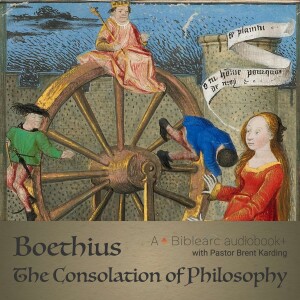
Chapter Summary
Since Boethius believes that God governs the universe, Philosophy says she is confident she has almost finished rescuing him from spiritual exile; however, she still wants to recount her arguments. God is happiness itself; therefore, he must be fully sufficient, and therefore he governs the universe alone. God is the Good itself, and governs the universe himself; therefore, he governs the universe through goodness. And all creatures submit to God’s guidance as they act according to their natures. Even if they oppose God, they will surely not succeed since God is all-powerful. God’s good governance of the universe, therefore, cannot fail.
Philosophy then tries to bring the arguments together to reveal a further truth: Since God can do anything, but cannot do evil, evil must be nothing. Boethius objects to this “labyrinth of tangled arguments,” reviewing Philosophy’s statements.
About The Consolation of Philosophy
Written in the 6th-century from a prison cell as the author awaits execution for a crime he did not commit, The Consolation of Philosophy is a dialogue between Boethius and a mysterious woman—Lady Philosophy—who helps him rediscover wisdom and virtue.
Subscribe now and begin walking the path of wisdom with us.
 Want to go deeper?
Want to go deeper?
You’re invited to join the companion course that dives deep into each of the five books. There, we’ll explore each chapter, with guided readings, discussion prompts, and study tools to enrich your journey. Enroll today.
No comments yet. Be the first to say something!